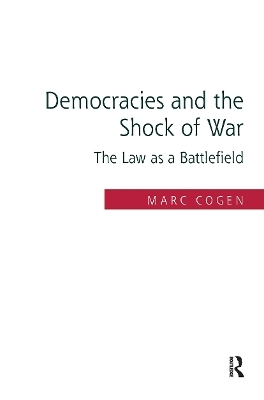
Democracies and the Shock of War
The Law as a Battlefield
Seiten
2012
Routledge (Verlag)
978-1-4094-4363-6 (ISBN)
Routledge (Verlag)
978-1-4094-4363-6 (ISBN)
Over the course of the twentieth century, democracies demonstrated an uncanny ability to win wars when their survival was at stake. This book argues that the legal frameworks imbedded in democratic societies offered them a fundamental advantage over their more politically restricted rivals.
Over the course of the twentieth century, democracies demonstrated an uncanny ability to win wars when their survival was at stake. As this book makes clear, this success cannot be explained merely by superior military equipment or a particular geographical advantage. Instead, it is argued that the legal frameworks imbedded in democratic societies offered them a fundamental advantage over their more politically restricted rivals. For democracies fight wars aided by codes of behaviour shaped by their laws, customs and treaties that reflect the wider values of their society. This means that voters and the public can influence the decision to wage and sustain war. Thus, a precarious balance between government, parliament and military leadership is the backbone of any democracy at war, and the key to success or failure. Beginning with the sixteenth- and seventeenth-century writings of Alberico Gentili and Hugo Grotius, this book traces the rise of legal concepts of war between states. It argues that the ideas and theories set out by the likes of Gentili and Grotius were to provide the bedrock of western democratic thinking in wartime. The book then moves on to look in detail at the two World Wars of the twentieth century and how legal thinking adapted itself to the realities of industrial and total war. In particular it focuses upon the impact of differing political ideologies on the conduct of war, and how combatant nations were frequently forced to challenge core beliefs and values in order to win. Through a combination of history and legal philosophy, this book contributes to a better understanding of democratic government when it is most severely tested at war. The ideas and concepts addressed will resonate, both with those studying the past, and current events.
Over the course of the twentieth century, democracies demonstrated an uncanny ability to win wars when their survival was at stake. As this book makes clear, this success cannot be explained merely by superior military equipment or a particular geographical advantage. Instead, it is argued that the legal frameworks imbedded in democratic societies offered them a fundamental advantage over their more politically restricted rivals. For democracies fight wars aided by codes of behaviour shaped by their laws, customs and treaties that reflect the wider values of their society. This means that voters and the public can influence the decision to wage and sustain war. Thus, a precarious balance between government, parliament and military leadership is the backbone of any democracy at war, and the key to success or failure. Beginning with the sixteenth- and seventeenth-century writings of Alberico Gentili and Hugo Grotius, this book traces the rise of legal concepts of war between states. It argues that the ideas and theories set out by the likes of Gentili and Grotius were to provide the bedrock of western democratic thinking in wartime. The book then moves on to look in detail at the two World Wars of the twentieth century and how legal thinking adapted itself to the realities of industrial and total war. In particular it focuses upon the impact of differing political ideologies on the conduct of war, and how combatant nations were frequently forced to challenge core beliefs and values in order to win. Through a combination of history and legal philosophy, this book contributes to a better understanding of democratic government when it is most severely tested at war. The ideas and concepts addressed will resonate, both with those studying the past, and current events.
Marc Cogen is Professor of International Law at Gent University and the Free University of Brussels, Belgium.
Introduction; Chapter 1 Gentili and Grotius; Chapter 2 Democracies, the First World War and the Peace of Versailles; Chapter 3 Democracies and the Second World War;
| Erscheint lt. Verlag | 28.5.2012 |
|---|---|
| Verlagsort | London |
| Sprache | englisch |
| Maße | 156 x 234 mm |
| Gewicht | 703 g |
| Themenwelt | Geisteswissenschaften ► Archäologie |
| Geschichte ► Allgemeine Geschichte ► Neuzeit (bis 1918) | |
| Geschichte ► Teilgebiete der Geschichte ► Militärgeschichte | |
| Recht / Steuern ► EU / Internationales Recht | |
| Recht / Steuern ► Privatrecht / Bürgerliches Recht ► Sachenrecht | |
| Recht / Steuern ► Rechtsgeschichte | |
| Sozialwissenschaften ► Politik / Verwaltung ► Politische Systeme | |
| ISBN-10 | 1-4094-4363-9 / 1409443639 |
| ISBN-13 | 978-1-4094-4363-6 / 9781409443636 |
| Zustand | Neuware |
| Haben Sie eine Frage zum Produkt? |
Mehr entdecken
aus dem Bereich
aus dem Bereich
Europa 1848/49 und der Kampf für eine neue Welt
Buch | Hardcover (2023)
DVA (Verlag)
48,00 €
Giordano Bruno - ein ketzerisches Leben
Buch | Hardcover (2024)
C.H.Beck (Verlag)
29,90 €


